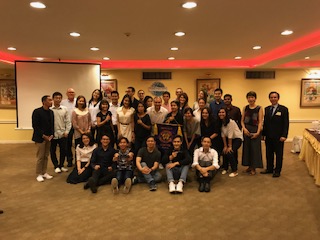“Ours is the only organization I know dedicated to the individual, we work together to bring out the best in each of us and then we apply these skills to help others,” cited Dr. Ralph C. Smedley, founder of Toastmasters International.
Tonight’s meeting was the best attended yet with 16 members and 17 guests.
President’s Remarks
Matt’s welcome back message was upbeating and welcoming.He hoped each of us had a wonderful break (we did not have our meeting last Monday May 20th observing a bank holiday) and enjoyed special time with friends and family. He was confident we returned to our Toastmasters meeting with renewed enthusiasm and vigor.
Word of the Day: Gradual
When Pichaya announced that “gradual” would be the word of the day, she gave examples of how the word can be used. Some of our club’s use of this word: “Personal development was marked by a gradual progression,” “Plastic bags take 500 years to gradually disintegrate,” “The story of gradual renewal of a man.”
Speaking Tips: Ethos, Logos, and Pathos
Nuch reflected on the workshop she recently attended. Hassan Ghiassi, CEO of Aristotle’s Cafe talked about the modes of persuasion used to convince audiences. They are referred to as the three artistic proofs (Aristotle coined the terms), and are all represented by Greek words: ethos, logos, and pathos.
As an effective communicator, you would use ethos to show to your audience that you are a credible source and is worth listening to. Ethos is the Greek word for “character.” The word “ethic” is derived from ethos.
Ethos example: “Because I’m your mother and I want the best for you.”
To use logos would be to cite facts and statistics, historical and literal analogies, and citing certain authorities on a subject. Logos is the Greek word for “word,” however the true definition goes beyond that, and can be most closely described as “the word or that by which the inward thought is expressed.” The word “logic” is derived from logos.
Logos example: “Because in 1999 they discovered that eating vegetable everyday cures 99% of all illnesses in the world.”
An effective communicator uses pathos to invoke sympathy from an audience; to make the audience feel what you want them to feel. A common use of pathos would be to draw pity from an audience. Another use of pathos would be to inspire anger from an audience, perhaps in order to prompt action. Pathos is the Greek word for both “suffering” and “experience.” The words empathy and pathetic are derived from pathos.
Pathos example: “Because if you don’t, you’ll break my heart and I’ll die a miserable death”
Table Topics
Piyatida creatively ran Table Topics. She picked random numbers from the audience and asked them to come on stage in pairs: one asked the question while another answered the question.Here are the questions:
“How do you like Toastmasters?”
“Did it hurt when you fell from heaven?”
“How can I improve my communication skills?”
“Does your current job/study reflect your personality?”
Speaker One: Wasana
Wasana (Sing) delivered her icebreaker speech. She spoke about her consultant work with the Gallup Poll and how she acquired her black belt Judo skills. Her personal evaluator, Pichaya, encouraged her to tell the audience more about her personal stories: family, passion, challenges etc.
Speaker Two: Isareeya
Isareeya (Mimi) opened her icebreaker speech with a story of her aunt and how she empathized with her aunt when she underwent procedure at the hospital. Mimi discover her life purpose when she was an intern assisting the surgeon in the vaginal delivery. She knew then and there that she wanted to become a doctor helping people in need. Linda was her personal evaluator who recommended Mimi make effective use of her speaking space.
Speaker Three: Lauren
Lauren delivered her level 1 speech 2 entitled: “12 minutes for 500 years.” She encouraged the audience to refrain from using plastic bags, plastic straws, styrofoam etc., as it’d take 500 years for micro-plastics to disintegrate. Lauren called us to apply the 5 Rs of zero waste to our daily activities: refuse, reduce, recycle, reuse and rot. Ajjima, her personal evaluator, encouraged her to slow down, as she seemed to miss some of the Rs. Ajjima also encouraged Lauren to cite examples for each of the R.
Speaker Four: Matt
In his level 3 speech 2 project, Matt chose the title: “Beyond Skill.” He recounted his Aha! moment when he prepared for his workshop to be conducted at the District 97P 2019 Annual Conference in May. Two lessons he learned: documented his work and built good relationships. Being good at something was not enough, you must build rapport, sustain and cultivate good relationships with people whom you wanted to know. Rattanakorn, his personal evaluation, commented on the importance of visibility; who knows you and who you know. He concluded by suggesting that Matt inject his personal anecdote how he successfully managed to document all his work.
The evening was concluded with recognition of the members’ achievements:
Best Table Topic: Lothar
Best Speaker: Lauren
Best Evaluator: Rattanakorn
As always, I left the meeting feeling inspired and empowered because at Toastmasters, we support and build each other up to become the best we can be.
Our next meeting is on June 10, 2019.
By Nuch Aumpradithpun DTM


